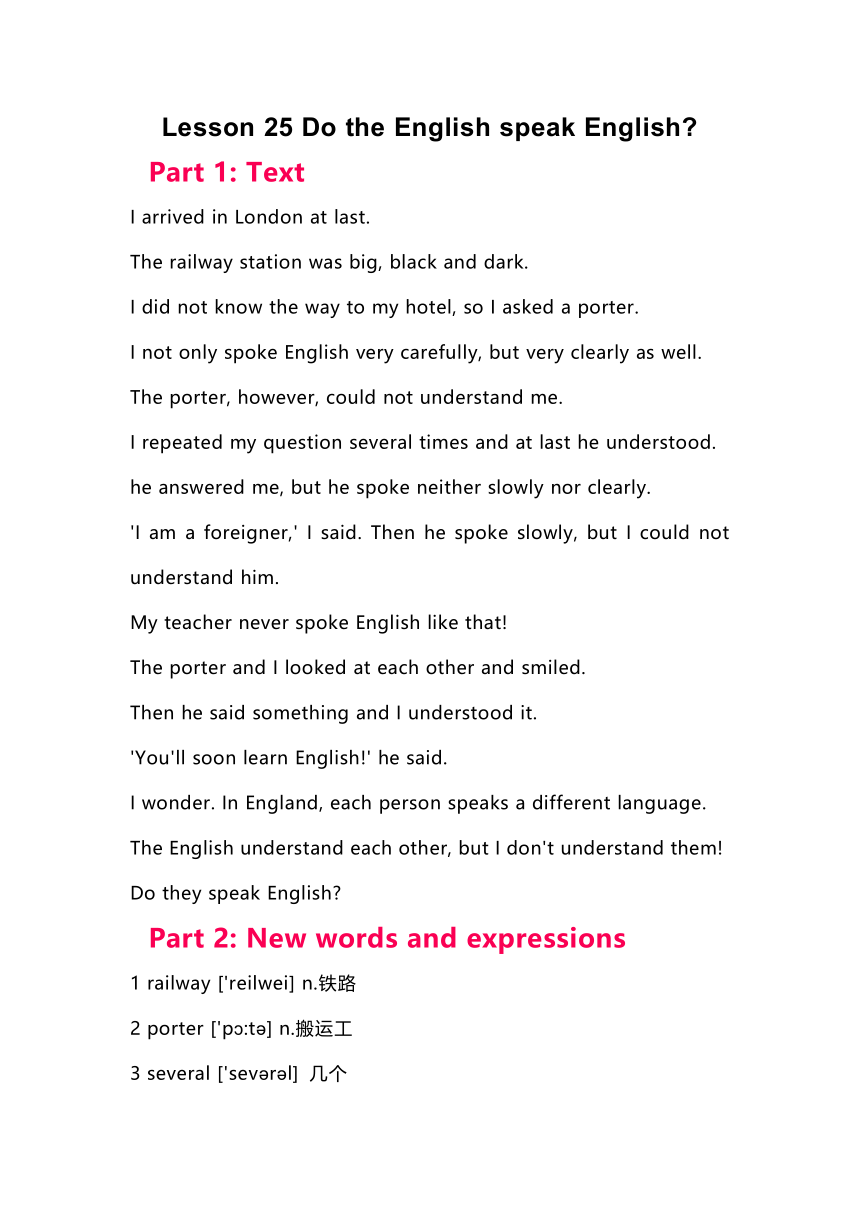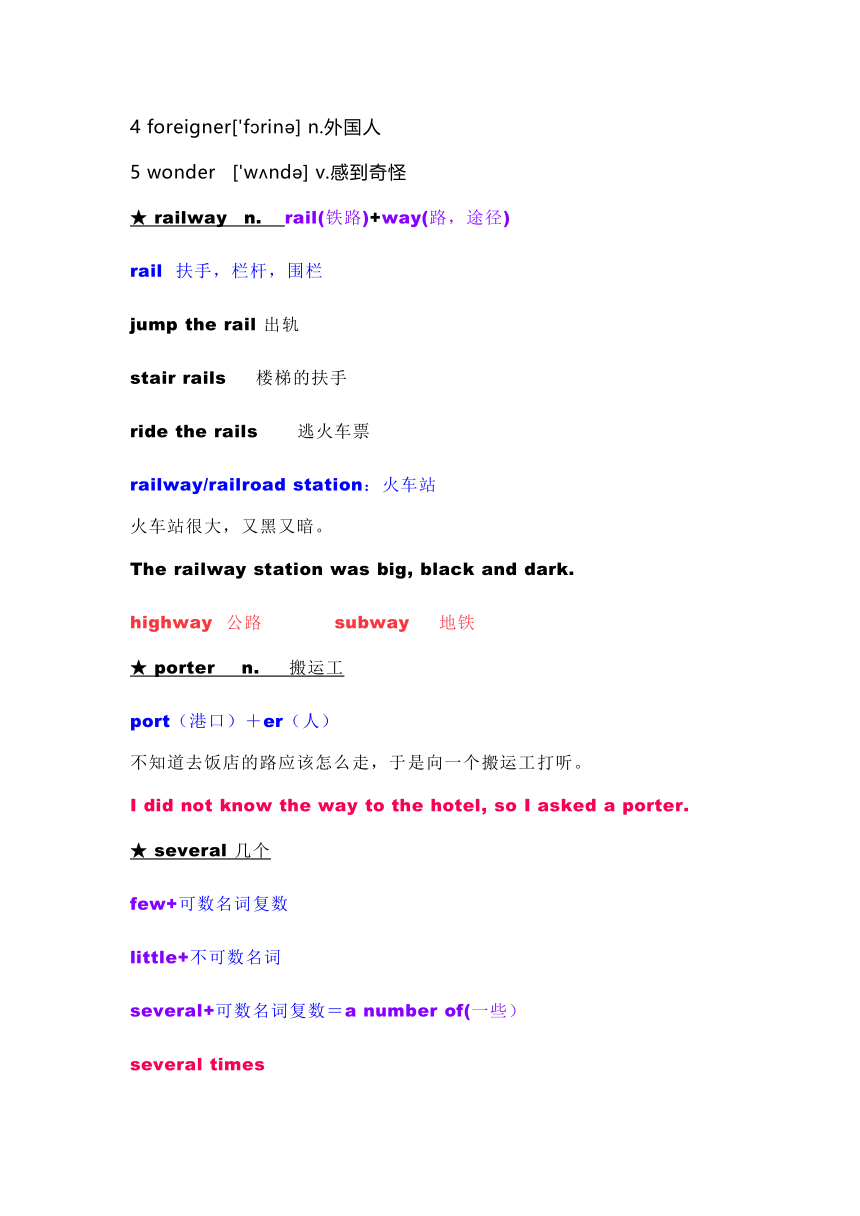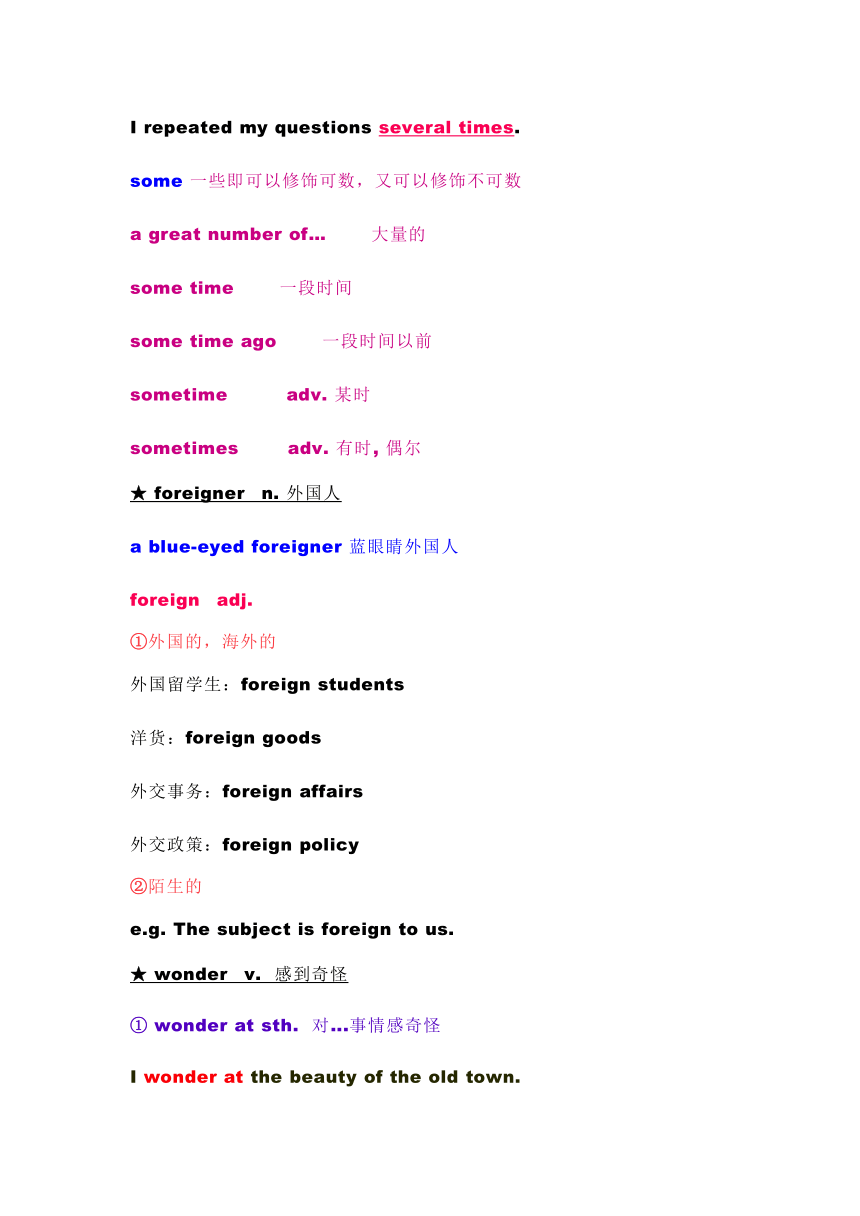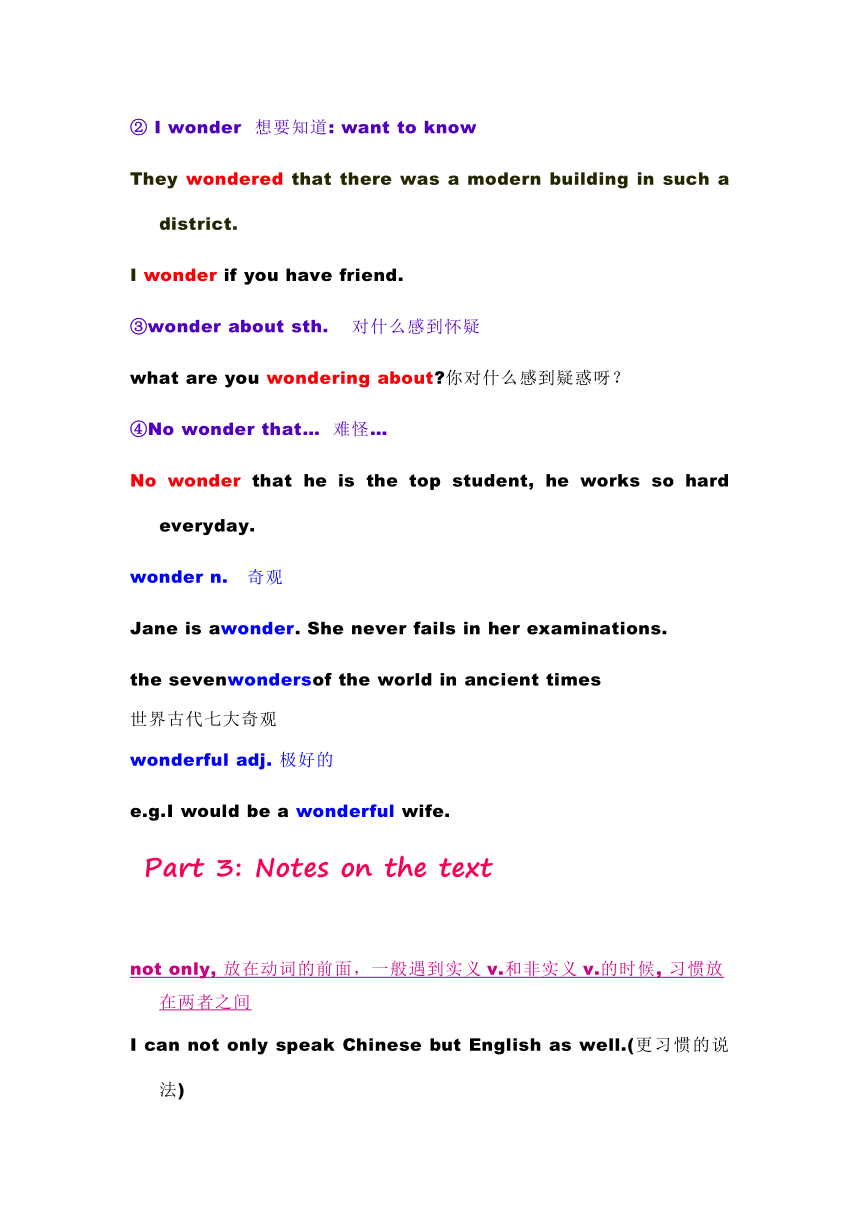新概念英语第二册 Lesson 25 Do the English speak English 讲义
文档属性
| 名称 | 新概念英语第二册 Lesson 25 Do the English speak English 讲义 |  | |
| 格式 | docx | ||
| 文件大小 | 23.9KB | ||
| 资源类型 | 教案 | ||
| 版本资源 | 新概念英语 | ||
| 科目 | 英语 | ||
| 更新时间 | 2023-09-24 22:33:29 | ||
图片预览




文档简介
Lesson 25 Do the English speak English
Part 1: Text
I arrived in London at last.
The railway station was big, black and dark.
I did not know the way to my hotel, so I asked a porter.
I not only spoke English very carefully, but very clearly as well.
The porter, however, could not understand me.
I repeated my question several times and at last he understood.
he answered me, but he spoke neither slowly nor clearly.
'I am a foreigner,' I said. Then he spoke slowly, but I could not understand him.
My teacher never spoke English like that!
The porter and I looked at each other and smiled.
Then he said something and I understood it.
'You'll soon learn English!' he said.
I wonder. In England, each person speaks a different language.
The English understand each other, but I don't understand them!
Do they speak English
Part 2: New words and expressions
1 railway ['reilwei] n.铁路
2 porter ['p :t ] n.搬运工
3 several ['sev r l] 几个
4 foreigner['f rin ] n.外国人
5 wonder ['w nd ] v.感到奇怪
★ railway n. rail(铁路)+way(路,途径)
rail 扶手,栏杆,围栏
jump the rail 出轨
stair rails 楼梯的扶手
ride the rails 逃火车票
railway/railroad station:火车站
火车站很大,又黑又暗。
The railway station was big, black and dark.
highway 公路 subway 地铁
★ porter n. 搬运工
port(港口)+er(人)
不知道去饭店的路应该怎么走,于是向一个搬运工打听。
I did not know the way to the hotel, so I asked a porter.
★ several 几个
few+可数名词复数
little+不可数名词
several+可数名词复数=a number of(一些)
several times
I repeated my questions several times.
some 一些即可以修饰可数,又可以修饰不可数
a great number of… 大量的
some time 一段时间
some time ago 一段时间以前
sometime adv. 某时
sometimes adv. 有时, 偶尔
★ foreigner n. 外国人
a blue-eyed foreigner 蓝眼睛外国人
foreign adj.
①外国的,海外的
外国留学生:foreign students
洋货:foreign goods
外交事务:foreign affairs
外交政策:foreign policy
②陌生的
e.g. The subject is foreign to us.
★ wonder v. 感到奇怪
① wonder at sth. 对...事情感奇怪
I wonder at the beauty of the old town.
② I wonder 想要知道: want to know
They wondered that there was a modern building in such a district.
I wonder if you have friend.
③wonder about sth. 对什么感到怀疑
what are you wondering about 你对什么感到疑惑呀?
④No wonder that… 难怪…
No wonder that he is the top student, he works so hard everyday.
wonder n. 奇观
Jane is awonder. She never fails in her examinations.
the sevenwondersof the world in ancient times
世界古代七大奇观
wonderful adj. 极好的
e.g.I would be a wonderful wife.
Part 3: Notes on the text
not only, 放在动词的前面,一般遇到实义v.和非实义v.的时候, 习惯放在两者之间
I can not only speak Chinese but English as well.(更习惯的说法)
Part 4: Grammar&Difficult points
并列句(compound sentence)
把两个或几个简单句用并列连词连接起来,则成为一个并列句。
1.表示转折关系的并列连词。这类连词主要有but, yet等。
Someone borrowed my pen, but I don’t remember who.
有人借了我的钢笔,但我不记得是谁了。
He said he was our friend, yet he wouldn’t help us
他说他是我们的朋友,但却不肯帮助我们。
2. 表示因果关系的并列连词。这类连词主要有for, so等。
The child had a bad cough, so his mother took him to the doctor.
这孩子咳得很利害,所以他妈妈带他去看医生。
You are supposed to get rid of carelessness, for it often leads to serious errors.
你们一定要克服粗心的毛病,因为粗心常常引起严重的错误。
3. 表示并列关系的并列连词。这类连词主要有and , or , either…or , neither…nor , not only…but (also) , both…and , as well as等。
He didn’t go and she didn’t go either.
他没去,她也没去。
The weather is mild today; it is neither hot nor cold
今天天气很温暖,不冷也不热。
Both New York and London have traffic problems.
纽约和伦敦都存在交通问题。
It is important for you as well as for me.
这对你和对我都很重要。
People who are either under age or over age may not join the army.
年龄不到或者超龄的人都不得参军。
就近原则
就近原则 即:谓语动词要与离它最近的主语在数上保持一致。
遵循该原则的有:there/here be …, or , neither……nor……, either……or……,not……but…… , not only……but also……,
1.there/here be 句型
There/Here is a book and some pencils on the desk.
=There/Here are some pencils and a book on the desk.
2.or
Was he or you invited to make a speech at the meeting
=Were you or he invited to make a speech at the meeting
3.neither...nor...
Neither you nor he is right.
= Neither he nor you are right.
4.either...or...
Either they or Jim is going to Shanghai next Saturday.
= Either Jim or they are going to shanghai next Saturday.
5.not....but
Not the boy but his parents were to blame.
Not his parents but the boy was to blame.
6.not only...but also...
Not only Ann but also her parents stay at home every Sunday.
= Not only Ann's parents but also she stays at home every Sunday.
就近原则 即:谓语动词要与离它最远的主语在数上保持一致。
此类词有: (along/together/combined)with, as well as, besides, like, without, except /but, including, in addition to,rather than,no less than,as much as 作插入语
1.(along/together/combined)with 属于同类词
He with his classmates is playing basketball.
Jim,together with his classmates,has seen the film.
Members of Congress , along with former president Bill Clinton, are on the guest list.
2.as well as
The captain, as well as the other players, was tired.
3.besides
Besides milk and cheese, we need vegetables.
4.like
Tracy, like many girls, loves dancing.
5.except/but
No one except /but me knows about this news.
6.including
All the students, including Tom, are leaving.
7.in addition to
The barn in addition to the house was burned.
8.rather than
John, rather than his friends, has broken the door.
9.no less than 不亚于
My mother, no less than I, is a foodie.
10.as much as
Some of the workers as much as the manager were responsible for the loss.
附加知识点:
a. Each student has a dictionary. (做主语)
b. The students each have a dictionary. (副词做同位语,而非主语)
a句的谓语用单数,这很显然。b句的谓语要用复数,这点考生很容易出错。其实a,b两句的意思是一样的(=每个学生都有一本字典),但是注意:b句真正的主语是the students,其后的each是主语的同位语,由于谓语是与主语保持一致(而不是与其同位语保持一致)
The young people each carry a big bag.
My brother and I each have a car.
Part 5: Homework
1.背诵lesson 25单词&课文
2.Retell the text
3.并列句式的要点和应用
Part 1: Text
I arrived in London at last.
The railway station was big, black and dark.
I did not know the way to my hotel, so I asked a porter.
I not only spoke English very carefully, but very clearly as well.
The porter, however, could not understand me.
I repeated my question several times and at last he understood.
he answered me, but he spoke neither slowly nor clearly.
'I am a foreigner,' I said. Then he spoke slowly, but I could not understand him.
My teacher never spoke English like that!
The porter and I looked at each other and smiled.
Then he said something and I understood it.
'You'll soon learn English!' he said.
I wonder. In England, each person speaks a different language.
The English understand each other, but I don't understand them!
Do they speak English
Part 2: New words and expressions
1 railway ['reilwei] n.铁路
2 porter ['p :t ] n.搬运工
3 several ['sev r l] 几个
4 foreigner['f rin ] n.外国人
5 wonder ['w nd ] v.感到奇怪
★ railway n. rail(铁路)+way(路,途径)
rail 扶手,栏杆,围栏
jump the rail 出轨
stair rails 楼梯的扶手
ride the rails 逃火车票
railway/railroad station:火车站
火车站很大,又黑又暗。
The railway station was big, black and dark.
highway 公路 subway 地铁
★ porter n. 搬运工
port(港口)+er(人)
不知道去饭店的路应该怎么走,于是向一个搬运工打听。
I did not know the way to the hotel, so I asked a porter.
★ several 几个
few+可数名词复数
little+不可数名词
several+可数名词复数=a number of(一些)
several times
I repeated my questions several times.
some 一些即可以修饰可数,又可以修饰不可数
a great number of… 大量的
some time 一段时间
some time ago 一段时间以前
sometime adv. 某时
sometimes adv. 有时, 偶尔
★ foreigner n. 外国人
a blue-eyed foreigner 蓝眼睛外国人
foreign adj.
①外国的,海外的
外国留学生:foreign students
洋货:foreign goods
外交事务:foreign affairs
外交政策:foreign policy
②陌生的
e.g. The subject is foreign to us.
★ wonder v. 感到奇怪
① wonder at sth. 对...事情感奇怪
I wonder at the beauty of the old town.
② I wonder 想要知道: want to know
They wondered that there was a modern building in such a district.
I wonder if you have friend.
③wonder about sth. 对什么感到怀疑
what are you wondering about 你对什么感到疑惑呀?
④No wonder that… 难怪…
No wonder that he is the top student, he works so hard everyday.
wonder n. 奇观
Jane is awonder. She never fails in her examinations.
the sevenwondersof the world in ancient times
世界古代七大奇观
wonderful adj. 极好的
e.g.I would be a wonderful wife.
Part 3: Notes on the text
not only, 放在动词的前面,一般遇到实义v.和非实义v.的时候, 习惯放在两者之间
I can not only speak Chinese but English as well.(更习惯的说法)
Part 4: Grammar&Difficult points
并列句(compound sentence)
把两个或几个简单句用并列连词连接起来,则成为一个并列句。
1.表示转折关系的并列连词。这类连词主要有but, yet等。
Someone borrowed my pen, but I don’t remember who.
有人借了我的钢笔,但我不记得是谁了。
He said he was our friend, yet he wouldn’t help us
他说他是我们的朋友,但却不肯帮助我们。
2. 表示因果关系的并列连词。这类连词主要有for, so等。
The child had a bad cough, so his mother took him to the doctor.
这孩子咳得很利害,所以他妈妈带他去看医生。
You are supposed to get rid of carelessness, for it often leads to serious errors.
你们一定要克服粗心的毛病,因为粗心常常引起严重的错误。
3. 表示并列关系的并列连词。这类连词主要有and , or , either…or , neither…nor , not only…but (also) , both…and , as well as等。
He didn’t go and she didn’t go either.
他没去,她也没去。
The weather is mild today; it is neither hot nor cold
今天天气很温暖,不冷也不热。
Both New York and London have traffic problems.
纽约和伦敦都存在交通问题。
It is important for you as well as for me.
这对你和对我都很重要。
People who are either under age or over age may not join the army.
年龄不到或者超龄的人都不得参军。
就近原则
就近原则 即:谓语动词要与离它最近的主语在数上保持一致。
遵循该原则的有:there/here be …, or , neither……nor……, either……or……,not……but…… , not only……but also……,
1.there/here be 句型
There/Here is a book and some pencils on the desk.
=There/Here are some pencils and a book on the desk.
2.or
Was he or you invited to make a speech at the meeting
=Were you or he invited to make a speech at the meeting
3.neither...nor...
Neither you nor he is right.
= Neither he nor you are right.
4.either...or...
Either they or Jim is going to Shanghai next Saturday.
= Either Jim or they are going to shanghai next Saturday.
5.not....but
Not the boy but his parents were to blame.
Not his parents but the boy was to blame.
6.not only...but also...
Not only Ann but also her parents stay at home every Sunday.
= Not only Ann's parents but also she stays at home every Sunday.
就近原则 即:谓语动词要与离它最远的主语在数上保持一致。
此类词有: (along/together/combined)with, as well as, besides, like, without, except /but, including, in addition to,rather than,no less than,as much as 作插入语
1.(along/together/combined)with 属于同类词
He with his classmates is playing basketball.
Jim,together with his classmates,has seen the film.
Members of Congress , along with former president Bill Clinton, are on the guest list.
2.as well as
The captain, as well as the other players, was tired.
3.besides
Besides milk and cheese, we need vegetables.
4.like
Tracy, like many girls, loves dancing.
5.except/but
No one except /but me knows about this news.
6.including
All the students, including Tom, are leaving.
7.in addition to
The barn in addition to the house was burned.
8.rather than
John, rather than his friends, has broken the door.
9.no less than 不亚于
My mother, no less than I, is a foodie.
10.as much as
Some of the workers as much as the manager were responsible for the loss.
附加知识点:
a. Each student has a dictionary. (做主语)
b. The students each have a dictionary. (副词做同位语,而非主语)
a句的谓语用单数,这很显然。b句的谓语要用复数,这点考生很容易出错。其实a,b两句的意思是一样的(=每个学生都有一本字典),但是注意:b句真正的主语是the students,其后的each是主语的同位语,由于谓语是与主语保持一致(而不是与其同位语保持一致)
The young people each carry a big bag.
My brother and I each have a car.
Part 5: Homework
1.背诵lesson 25单词&课文
2.Retell the text
3.并列句式的要点和应用
同课章节目录
